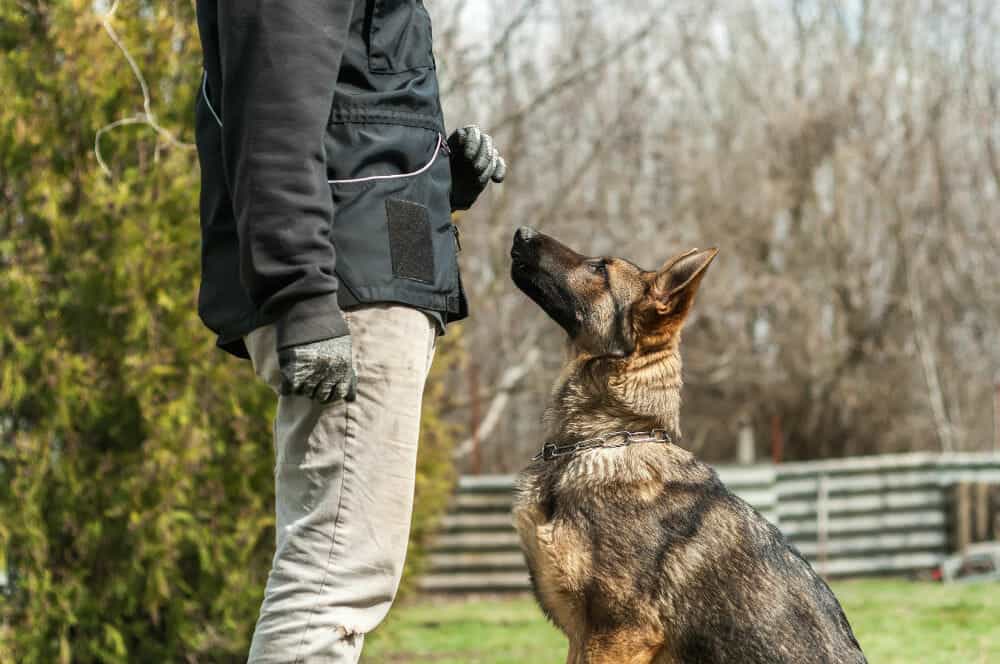Unlock Your Dog's Possible: Proven Pet Dog Training Strategies for Success
Efficient canine training is a nuanced process that rests on comprehending canine actions and using scientifically backed techniques. Dog training. By integrating positive reinforcement, establishing clear commands, and focusing on socialization, pet proprietors can cultivate a productive connection with their pets. Challenges frequently develop that require tailored options and an individual method. Discovering these shown techniques reveals not just the potential for behavior improvement yet also the deeper bond that can be formed between owner and pet dog. What vital approaches must be considered to absolutely open your pet dog's capacity?
Understanding Pet Behavior
Comprehending dog behavior is necessary for reliable training and fostering a favorable connection between pets and their proprietors. A detailed understanding of canine body language, articulations, and social interactions is essential for identifying their feelings and needs. Pets communicate mainly through non-verbal cues; as an example, a wagging tail may indicate exhilaration, while pinned ears can signify fear or entry.

In addition, environmental factors play a substantial duty fit a pet dog's habits. Adjustments in routine, brand-new surroundings, or the existence of unknown people can lead to tension or stress and anxiety in pet dogs. Recognizing these triggers enables proprietors to alleviate damaging responses and develop suitable training strategies.
Eventually, a deep understanding of pet dog habits lays the foundation for successful training methods, improving both habits and the overall bond between the canine and its proprietor. Dog training. This knowledge is essential for fostering a well-adjusted, delighted canine buddy
Favorable Support Methods
Reliable training relies greatly on favorable reinforcement techniques, which have been revealed to generate substantial lead to shaping wanted habits in pets. This approach entails rewarding a pet dog for showing details behaviors, therefore increasing the possibility that these actions will certainly be repeated. Benefits can take numerous kinds, including deals with, praise, toys, or playtime, depending upon what encourages the private canine.

It is important to slowly phase out incentives as the pet discovers the behavior, transitioning to intermittent reinforcement. This strategy keeps the actions in time while avoiding dependence on consistent benefits. By concentrating on favorable reinforcement, trainers can cultivate a trusting connection with their pets, promoting a cooperative and healthy training setting that improves total obedience and efficiency.
Developing Constant Commands
An essential aspect of effective pet training is the establishment of constant commands. Uniformity in commands is crucial for reliable interaction between the trainer and the pet. When commands are uniform, canines discover to link certain words with wanted actions, which speeds up the training procedure and improves understanding.
To develop consistent commands, it is crucial that all family participants utilize the exact same terms and motions. If one person utilizes "sit" while another says "sit down," it can develop complication for the pet dog. Select clear, distinctive words for commands and ensure every person entailed in the canine's training abides by these options.
In addition, repetition is key. Strengthen commands through constant method, making sure that the canine gets ample possibilities to react properly. When a canine efficiently adheres to a command, instant favorable support needs to comply with. This could be in the type of deals with, praise, or play, solidifying the connection in between the action and the command.
Last but not least, be patient. Developing constant commands takes time and effort. With dedication and clarity, you will aid your pet dog develop a strong understanding of expectations, ultimately resulting in a well-behaved friend.
Socializing and Exposure
Socializing a pet dog is crucial for fostering a positive and well-adjusted friend. This process includes subjecting your pet to a selection of atmospheres, people, and other pets to develop their social skills and versatility. Early socializing, preferably in between the ages of 3 to fourteen weeks, is vital, as it lays the foundation for a pet's future habits.
During socialization, purpose to give positive experiences in different setups, such as parks, busy streets, and homes with other animals. Present your pet to numerous stimulations, including sounds, sights, and smells, making certain that each experience is fulfilling. This direct exposure helps minimize fear and anxiety, paving the way for a more durable pet dog.
Taking part in regulated group play sessions with other dogs can also improve social abilities, teaching your pet suitable communications and borders. Constantly monitor your canine's comfort level throughout these experiences, gradually boosting direct exposure as their self-confidence expands. Remember, the goal is to create an all-round animal that flourishes in diverse circumstances, promoting a harmonious partnership with both humans and other animals. Focusing on socializing will considerably contribute to your canine's total joy and behavior throughout their life.
Overcoming Common Training Difficulties

Dogs may struggle to focus in strange or hectic settings. Gradually desensitize your canine to diversions by starting training in a peaceful atmosphere and slowly introducing more stimulations as they come to be proficient.
Furthermore, behavior concerns like leaping or too much barking can come to be frustrating. Address these by instructing alternate habits, such as sitting comfortably when welcoming visitors. Uniformity and perseverance are critical; enhance desired actions consistently and avoid scolding, which can lead to confusion.
Last husbandry training but not least, recognize that each pet is unique, and training timelines might differ. Dressmaker your technique to your pet dog's private requirements, and seek professional guidance if necessary. With perseverance and the appropriate approaches, getting over these obstacles can cause a well-trained, pleased canine companion.
Conclusion
Finally, opening a pet dog's potential necessitates a thorough strategy that integrates an understanding of canine behavior, the application of favorable support methods, and the establishment of regular commands. Early socializing and exposure to varied atmospheres further boost a pet dog's adaptability and self-confidence. By attending to common training obstacles with customized strategies and perseverance, a harmonious and cooperative partnership between pet and handler can be cultivated, eventually resulting in a mannerly companion qualified of thriving in numerous situations.
Reliable canine training is a nuanced procedure that hinges on recognizing canine behavior and using scientifically backed methods.Understanding pet dog behavior is necessary for effective training and promoting a positive connection in between american pit bull terrier training dogs and their proprietors.Reliable training relies greatly on favorable reinforcement methods, which have actually been shown to produce substantial results in shaping wanted behaviors in canines. When commands are consistent, pets learn to connect details words with desired actions, which speeds up the training procedure and enhances understanding.
In conclusion, opening a pet's potential necessitates a detailed strategy that incorporates an understanding of canine behavior, the application of positive support strategies, and the facility of regular commands.
Comments on “Raise Your Abilities with Local Dog Training Charlotte Programs”